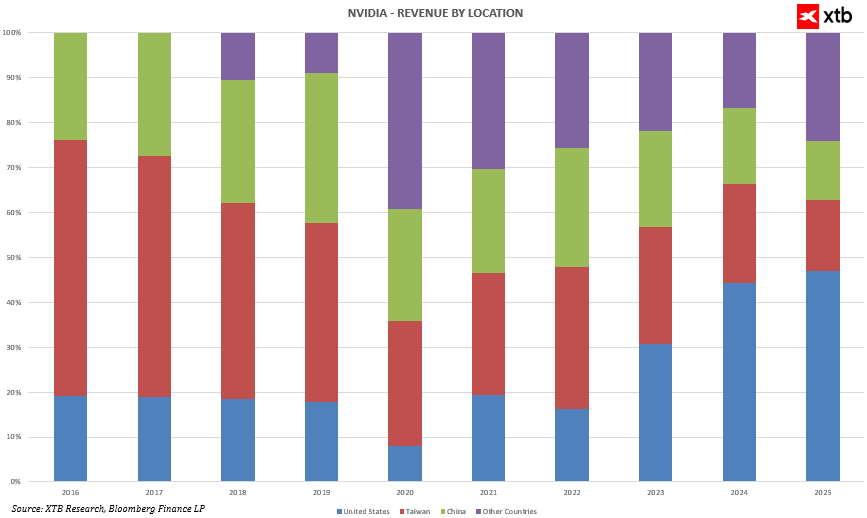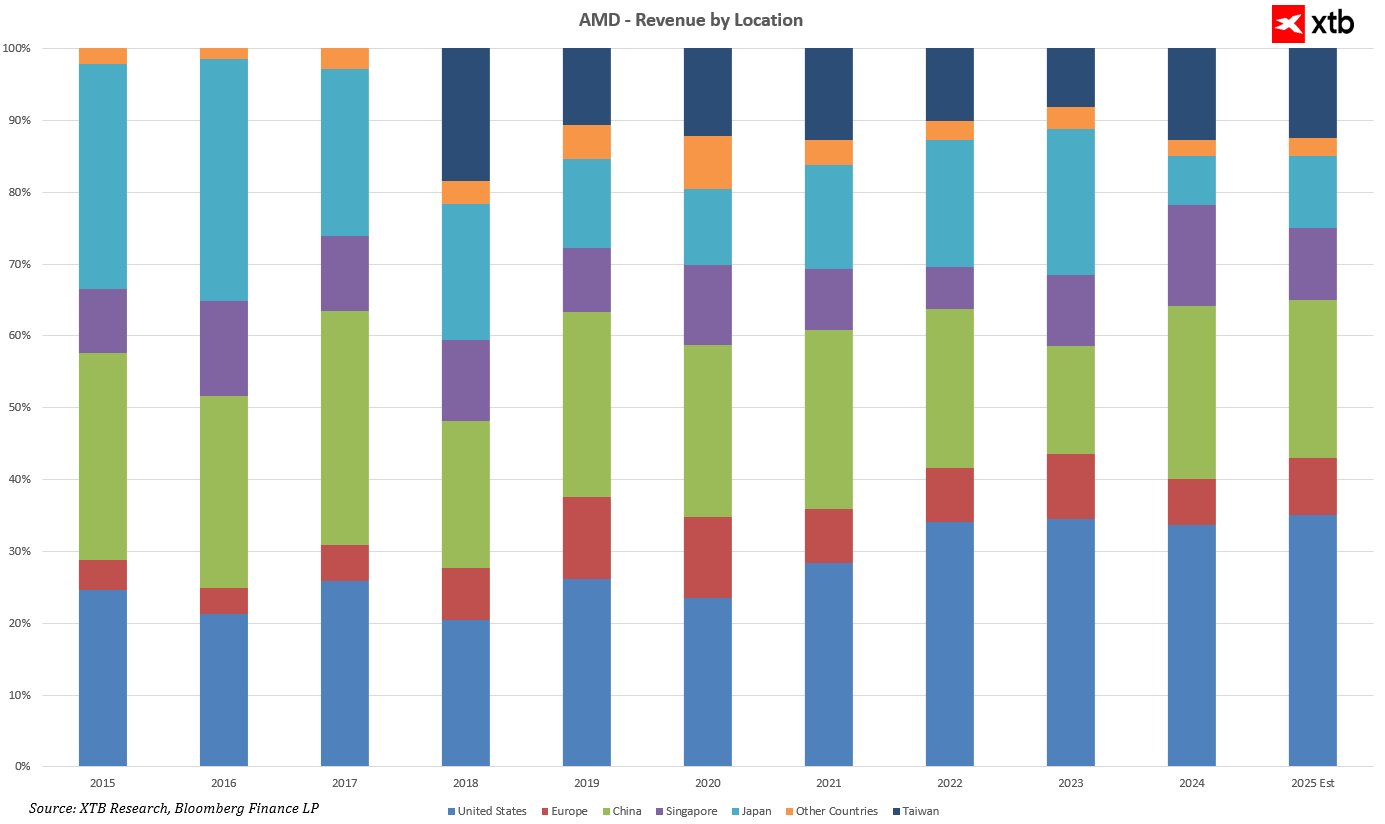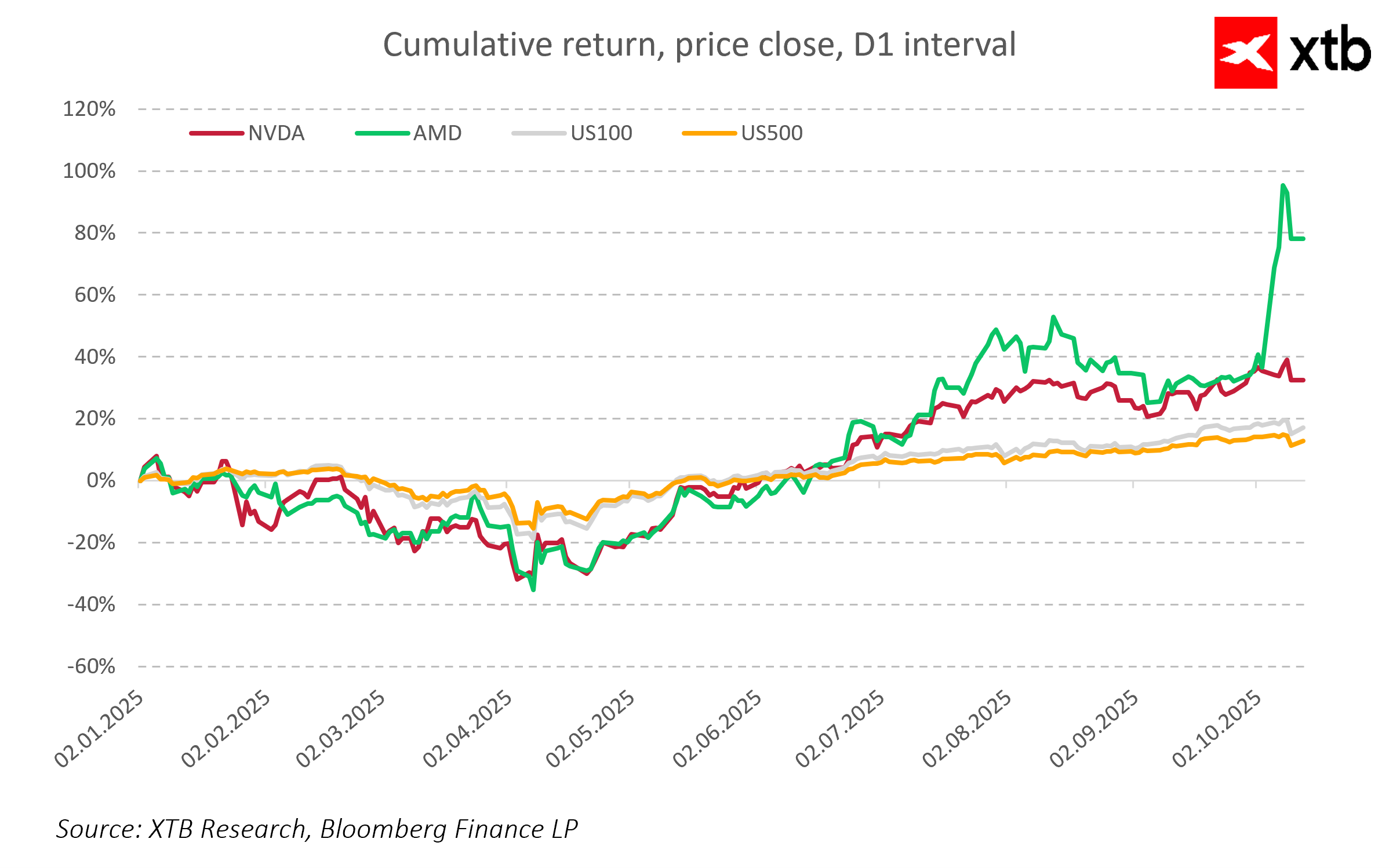- GAIN AI Act: The new law requires chip manufacturers, such as Nvidia and AMD, to prioritize serving the domestic market before exporting, especially to China. This is part of a broader U.S. strategy aimed at maintaining technological superiority and national security.
- The strategic role of advanced AI chips: Integrated circuits used in artificial intelligence have become a key resource in the U.S.-China rivalry, on par with energy commodities.
- GAIN AI Act: The new law requires chip manufacturers, such as Nvidia and AMD, to prioritize serving the domestic market before exporting, especially to China. This is part of a broader U.S. strategy aimed at maintaining technological superiority and national security.
- The strategic role of advanced AI chips: Integrated circuits used in artificial intelligence have become a key resource in the U.S.-China rivalry, on par with energy commodities.
In recent years, the technological rivalry between the United States and China has intensified significantly. Advanced integrated circuits used in artificial intelligence (AI) have come to play a key role in this geopolitical confrontation and are now considered a strategic resource almost on par with crude oil and energy commodities. The growing strength of China’s military technology, surveillance systems, and AI solutions has prompted the U.S. to impose a series of export restrictions, including bans on the sale of chips produced by Nvidia, limiting Beijing’s access to the latest technologies such as the H100 chips used, among other things, for advanced AI computations.
In response to escalating trade and technology tensions, the U.S. Senate passed the GAIN AI Act. This legislation requires chip manufacturers such as Nvidia and AMD to prioritize meeting domestic customer demand before exporting products to foreign markets, including China. The law is part of a broader U.S. strategy aimed at maintaining technological superiority in the AI sector and restricting Beijing’s access to cutting-edge solutions. It also responds to the intensifying competition for dominance in the semiconductor industry, a critical area for both the economy and national security.
The administration of Donald Trump, which began its second term in January 2025, continues the policy of protecting American dominance in AI while simultaneously supporting domestic semiconductor manufacturers. Although the GAIN AI Act still awaits approval by the House of Representatives and the president’s signature, it has already sparked diverse reactions. Supporters emphasize the need to protect national interests, while critics warn of the risk of escalating trade tensions and disruptions in global supply chains.
Giants like AMD and Nvidia are the main beneficiaries of the AI technology boom. Their advanced chips drive the development of artificial intelligence and fuel current growth in the technology market. These companies report dynamic revenue growth, particularly in the American market, which has become crucial for them. However, significant revenues also come from China and other important Asian markets such as Taiwan and Singapore, which are increasingly exposed to risks associated with rising geopolitical tensions and export restrictions.


The GAIN AI Act may enhance sales stability in the domestic market but simultaneously limit expansion opportunities into foreign markets, especially China. In the coming quarters, companies may feel pressure to adjust to the new regulations, which could slow revenue growth outside the U.S.
For investors, these changes pose a challenge. Despite impressive stock price increases for AMD and Nvidia since early 2025, the prospect of further export restrictions and growing regulatory uncertainty may raise concerns about the companies’ long-term stability and growth potential. This could lead to increased stock price volatility and selling pressure, especially in the short term.

The future of AMD and Nvidia will largely depend on their ability to respond flexibly to rapidly changing political and economic conditions that currently shape the global technology market. These companies must not only continue technological innovation but also effectively manage risks arising from tightening export regulations and growing geopolitical pressure, particularly amid escalating tensions between the U.S. and China. A key factor will be the ability to adapt supply chains, revise sales strategies, and develop relationships with domestic customers while seeking new expansion opportunities in markets less affected by sanctions. Investors should closely monitor the legislative process related to the GAIN AI Act and the responses of AMD and Nvidia to these regulations. Actions taken by these companies, such as diversifying product portfolios, investing in research and development, and forming strategic partnerships, may be decisive for their long-term growth and financial stability.
Daily Summary: Wall Street ends the week with a calm gain 🗽 Cryptocurrencies slide
NATGAS surges 5% reaching 3-year high 🔎
Bitcoin loses 3% 📉Technical bearish flag pattern?
3 markets to watch next week (05.12.2025)
The content of this report has been created by XTB S.A., with its registered office in Warsaw, at Prosta 67, 00-838 Warsaw, Poland, (KRS number 0000217580) and supervised by Polish Supervision Authority ( No. DDM-M-4021-57-1/2005). This material is a marketing communication within the meaning of Art. 24 (3) of Directive 2014/65/EU of the European Parliament and of the Council of 15 May 2014 on markets in financial instruments and amending Directive 2002/92/EC and Directive 2011/61/EU (MiFID II). Marketing communication is not an investment recommendation or information recommending or suggesting an investment strategy within the meaning of Regulation (EU) No 596/2014 of the European Parliament and of the Council of 16 April 2014 on market abuse (market abuse regulation) and repealing Directive 2003/6/EC of the European Parliament and of the Council and Commission Directives 2003/124/EC, 2003/125/EC and 2004/72/EC and Commission Delegated Regulation (EU) 2016/958 of 9 March 2016 supplementing Regulation (EU) No 596/2014 of the European Parliament and of the Council with regard to regulatory technical standards for the technical arrangements for objective presentation of investment recommendations or other information recommending or suggesting an investment strategy and for disclosure of particular interests or indications of conflicts of interest or any other advice, including in the area of investment advisory, within the meaning of the Trading in Financial Instruments Act of 29 July 2005 (i.e. Journal of Laws 2019, item 875, as amended). The marketing communication is prepared with the highest diligence, objectivity, presents the facts known to the author on the date of preparation and is devoid of any evaluation elements. The marketing communication is prepared without considering the client’s needs, his individual financial situation and does not present any investment strategy in any way. The marketing communication does not constitute an offer of sale, offering, subscription, invitation to purchase, advertisement or promotion of any financial instruments. XTB S.A. is not liable for any client’s actions or omissions, in particular for the acquisition or disposal of financial instruments, undertaken on the basis of the information contained in this marketing communication. In the event that the marketing communication contains any information about any results regarding the financial instruments indicated therein, these do not constitute any guarantee or forecast regarding the future results.


